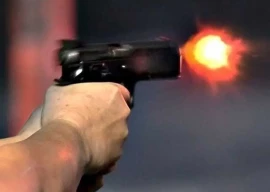
The sacrifice on Eidul Azha, which commemorates the sacrifice that Prophet Ibrahim made, is the second-most important religious ritual in Islam.
Statistics collected by vendors showed that this year the prices of sacrificial animals have doubled compared to last year as a result of the recent floods in the country.
“Many of the retired and in-service government and private sector employees are unable to perform this obligation because sacrificial animals are beyond their purchasing power,” Misal Khan, a retired government official, said.
He said that the only that the prices of animals could come down is if authorities take action against the smuggling of animals to neighbouring countries.
“The total sale of sacrificial animals in a day this year is around 1,000 to 1,200 as opposed to 1,500 to 2,000 last year,” Karim Khan, a contractor at Lala Kalay cattle market, said. So far, he said, they have received about 15,000 animals from the Punjab and provinces and expects more from other provinces in the next coming days.
An official from the Agriculture Department has said that the floods have led to the death of more than 94,000 cows and over 29,000 buffalos, causing an estimated Rs1.769 billion in losses.
“I brought 18 trucks of cattle, 10 animals in each truck, from Tando Jam in Sindh, and my father is sending 10 more trucks,” Asghar Somro, an inter- provincial exporter in Sindh, said.
Somro said that he sold a buffalo at the rate of Rs55,000 on Sunday morning and was earning two times more as compared to last year.
“The prices of cows and oxen are higher than last year as we are importing them from Sahiwal, Sialkot and Kasur districts of Punjab,” Hameedullah, a cattle businessman in Peshawar, said.
He said that he refused an offer of Rs75,000 for his ox named “Sudaghar” last Saturday – he was demanding Rs100, 000.
According to sellers, when their animals are not sold before Eid, they suffer huge financial losses. “No one wants to buy them at those prices after Eid, we only make a profit when we sell them before Eid,” one seller said.
“There has been a gradual decrease in the number of sacrificial animals in Khyber-Pakhtunkhwa during the last few years as Eidul Azha approaches,” a veterinary doctor, working at the Artificial Insemination Directorate Livestock and Dairy Development, said.
About 50,000 to 55,000 cattle slaughtered on Eidul Azha in Khyber-Pakhtunkhwa (K-P) alone, he said. “We have no choice but to import cattle from Punjab to ensure the availability of sacrificial animals,” the doctor added.
Around 70 to 75 per cent of cattle brought from Punjab are sold in K-P, while about 25 per cent are exported to Afghanistan, he said. “The cattle mafia are buying sacrificial animals at cheaper rates in Peshawar and transporting them to Afghanistan to earn more money,” he added.
“Traditionally, Pakistan relies on India to meet its meat-consumption demand, but the decline in imports from the eastern border has left us with insufficient livestock to cater to the increased demand in local market due to Eidul Azha,” he said.
Published in The Express Tribune, November 15th, 2010.




1730959638-0/trump-(19)1730959638-0-165x106.webp)

1732436825-0/BeFunk_§_]__-(47)1732436825-0.jpg)


1732432596-0/BeFunk_§_]__-(45)1732432596-0.jpg)
1732438009-0/BeFunk_§_]__-(48)1732438009-0.jpg)






COMMENTS
Comments are moderated and generally will be posted if they are on-topic and not abusive.
For more information, please see our Comments FAQ